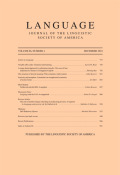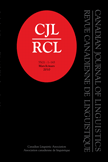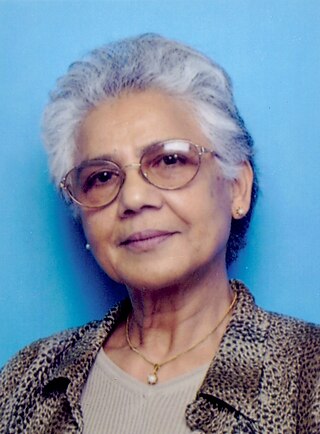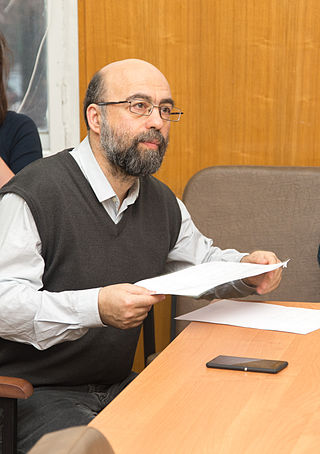The following outline is provided as an overview and topical guide to linguistics:

Michael Alexander Kirkwood Halliday was a British linguist who developed the internationally influential systemic functional linguistics (SFL) model of language. His grammatical descriptions go by the name of systemic functional grammar. Halliday described language as a semiotic system, "not in the sense of a system of signs, but a systemic resource for meaning". For Halliday, language was a "meaning potential"; by extension, he defined linguistics as the study of "how people exchange meanings by 'languaging'". Halliday described himself as a generalist, meaning that he tried "to look at language from every possible vantage point", and has described his work as "wander[ing] the highways and byways of language". But he said that "to the extent that I favoured any one angle, it was the social: language as the creature and creator of human society".
Corpus linguistics is the study of a language as that language is expressed in its text corpus, its body of "real world" text. Corpus linguistics proposes that a reliable analysis of a language is more feasible with corpora collected in the field—the natural context ("realia") of that language—with minimal experimental interference. The large collections of text allow linguists to run quantitative analyses on linguistic concepts, otherwise harder to quantify.
Theoretical linguistics is a term in linguistics that, like the related term general linguistics, can be understood in different ways. Both can be taken as a reference to the theory of language, or the branch of linguistics that inquires into the nature of language and seeks to answer fundamental questions as to what language is, or what the common ground of all languages is. The goal of theoretical linguistics can also be the construction of a general theoretical framework for the description of language.
Applied linguistics is an interdisciplinary field which identifies, investigates, and offers solutions to language-related real-life problems. Some of the academic fields related to applied linguistics are education, psychology, communication research, information science, natural language processing, anthropology, and sociology. Applied linguistics is a practical use of language.

The Linguistic Society of America (LSA) is a learned society for the field of linguistics. Founded in New York City in 1924, the LSA works to promote the scientific study of language. The society publishes three scholarly journals: Language, the open access journal Semantics and Pragmatics, and the open access journal Phonological Data & Analysis. Its annual meetings, held every winter, foster discussion amongst its members through the presentation of peer-reviewed research, as well as conducting official business of the society. Since 1928, the LSA has offered training to linguists through courses held at its biennial Linguistic Institutes held in the summer. The LSA and its 3,600 members work to raise awareness of linguistic issues with the public and contribute to policy debates on issues including bilingual education and the preservation of endangered languages.

Winfred Philip Lehmann was an American linguist who specialized in historical, Germanic, and Indo-European linguistics. He was for many years a professor and head of departments for linguistics at the University of Texas at Austin, and served as president of both the Linguistic Society of America and the Modern Language Association. Lehmann was also a pioneer in machine translation. He lectured a large number of future scholars at Austin, and was the author of several influential works on linguistics.

Natural Language & Linguistic Theory is a quarterly peer-reviewed academic journal covering theoretical and generative linguistics. It was established in 1983 and originally published by Kluwer Academic Publishers. Since 2004 the journal is published by Springer Science+Business Media. The editor-in-chief is Julie Anne Legate.
Michael Silverstein was an American linguist who served as the Charles F. Grey Distinguished Service Professor of anthropology, linguistics, and psychology at the University of Chicago. He was a theoretician of semiotics and linguistic anthropology. Over the course of his career he created an original synthesis of research on the semiotics of communication, the sociology of interaction, Russian formalist literary theory, linguistic pragmatics, sociolinguistics, early anthropological linguistics and structuralist grammatical theory, together with his own theoretical contributions, yielding a comprehensive account of the semiotics of human communication and its relation to culture. He presented the developing results of this project annually from 1970 until his death in a course entitled "Language in Culture". Among other achievements, he was instrumental in introducing the semiotic terminology of Charles Sanders Peirce, including especially the notion of indexicality, into the linguistic and anthropological literature; with coining the terms metapragmatics and metasemantics in drawing attention to the central importance of metasemiotic phenomena for any understanding of language or social life; and with introducing language ideology as a field of study. His works are noted for their terminological complexity and technical difficulty.

Language is a peer-reviewed quarterly academic journal published by the Linguistic Society of America since 1925. It covers all aspects of linguistics, focusing on the area of theoretical linguistics. Its current editor-in-chief is Andries Coetzee.
The Linguistic Bibliography / Bibliographie Linguistique is an annual publication which first appeared in 1949. The publication provides comprehensive bibliographical descriptions of publications in theoretical linguistics, with about 20,000 items added per year. Since 2002, the database has also been available online, as Linguistic Bibliography Online, and contains data from 1993 onward.
Linguistics is the scientific study of language. Linguistics is based on a theoretical as well as a descriptive study of language and is also interlinked with the applied fields of language studies and language learning, which entails the study of specific languages. Before the 20th century, linguistics evolved in conjunction with literary study and did not employ scientific methods. Modern-day linguistics is considered a science because it entails a comprehensive, systematic, objective, and precise analysis of all aspects of language – i.e., the cognitive, the social, the cultural, the psychological, the environmental, the biological, the literary, the grammatical, the paleographical, and the structural.

The Canadian Journal of Linguistics is a triannual peer-reviewed academic journal covering theoretical and applied linguistics. It is published by Cambridge University Press on behalf of the Canadian Linguistic Association. The journal was established in 1954 as the Journal of the Canadian Linguistic Association. It changed its name to the current title in 1961. The editor-in-chief is Heather Newell. The co-editor is Daniel Siddiqi.

The Journal of Phonetics is a peer-reviewed academic journal that covers topics in phonetics and phonology. It was established in 1973 and appears six times a year. It is published by Elsevier and the current editor-in-chief is Taehong Cho.

Ruqaiya Hasan was a professor of linguistics who held visiting positions and taught at various universities in England. Her last appointment was at Macquarie University in Sydney, from which she retired as emeritus professor in 1994. Throughout her career she researched and published widely in the areas of verbal art, culture, context and text, text and texture, lexicogrammar and semantic variation. The latter involved the devising of extensive semantic system networks for the analysis of meaning in naturally occurring dialogues.
Farzad Sharifian was a pioneer of cultural linguistics and held the Chair in Cultural Linguistics at Monash University. He developed a theoretical and an analytical framework of cultural cognition, cultural conceptualisations, and language, which draw on and expands the analytical tools and theoretical advancements in several disciplines and sub-disciplines, including cognitive psychology, anthropology, distributed cognition, and complexity science. The theoretical/analytical frameworks and their applications in several areas of applied linguistics including intercultural communication, cross-cultural/intercultural pragmatics, World Englishes, Teaching English as an International Language (TEIL), and political discourse analysis are the subject of Sharifian’s monographs entitled Cultural Conceptualisations and Language and Cultural Linguistics. These books have widely been recognised as laying "solid theoretical and analytical grounds for what can be recognised as Cultural Linguistics"..
The Australian Linguistic Society (ALS) is an academic association for linguists. It was established in 1967 with the primary goal of furthering interest in and support for linguistics research and teaching in Australia. The Australian Linguistic Society also publishes a peer-reviewed academic journal, the Australian Journal of Linguistics, holds an annual conference, an occasional linguistics institute, and has developed and endorsed several policies and statements relating to language and linguistics.
Rachel Nordlinger is an Australian linguist and a professor at The University of Melbourne.

Vladimir Plungian is a Russian linguist, specialist in linguistic typology and theory of grammar, morphology, corpus linguistics, African studies, poetics.









